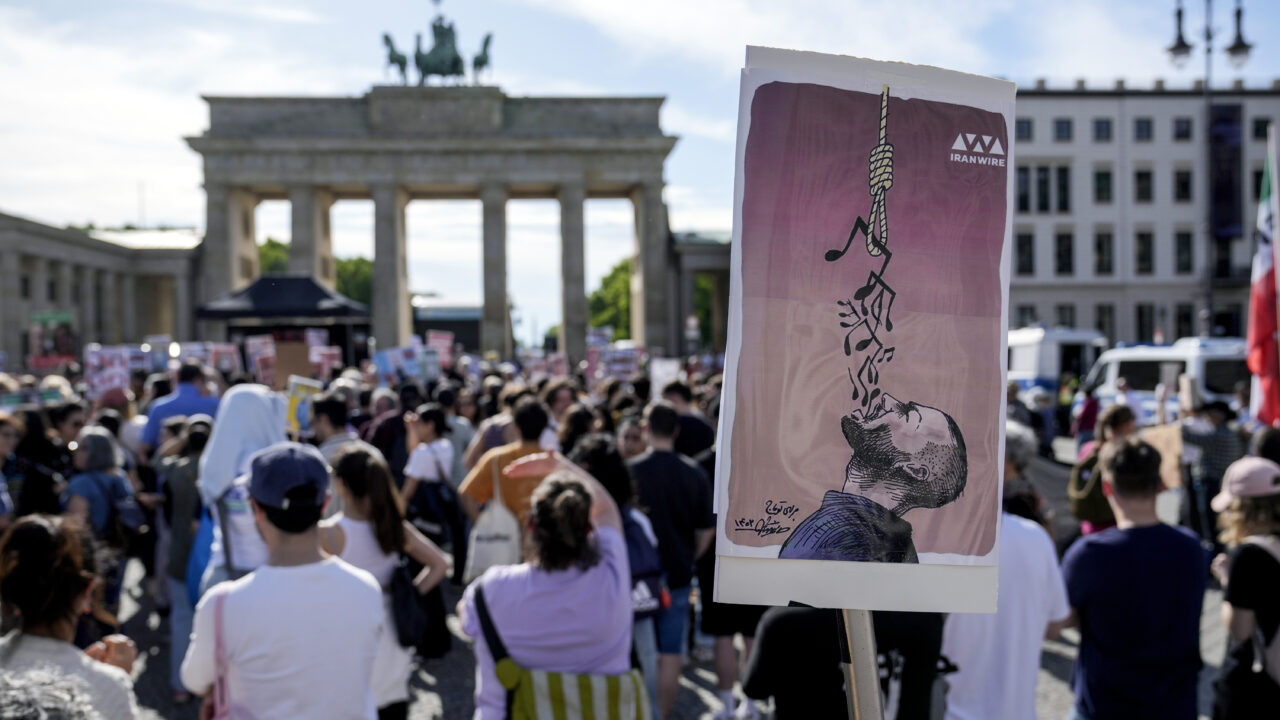May 2, 2024
A political
rapper faces the death penalty amid a fresh crackdown on women.

Protesters
attend a rally against a death sentence given to popular rapper, Toomaj
Salehi, in Iran and to support to the women of Iran, in Berlin,
Germany, Sunday, April 28, 2024. (AP Photo/Ebrahim Noroozi)
Toomaj Salehi
raps about subjects not often publicly discussed in the Islamic Republic of
Iran. His hard-hitting songs touch on child poverty, discrimination against
minorities and regime corruption, often accompanied by videos that depict him
confronting regime clerics. Social justice themes are common in the “rap-e
Farsi” genre that arose in Iran in the 1990s, but few have been as bold as
Salehi. A Persian-rapping Tupac Shakur, Salehi is so direct in his criticisms
of the regime, some have assumed he must live abroad; when his first big hit,
“Rat Hole,” landed in 2021, he had to do an Instagram Live to prove he actually
lived in Iran.
On April 24,
Salehi received a death sentence from the Revolutionary Court of Isfahan for
the crimes of rapping in support of the Woman Life Freedom movement and posting
videos of himself at protests.
When the
women-led protests broke out in September 2022 — sparked by the killing of
Mahsa Jina Amini by the Morality Police for “bad hijab” — the Woman Life
Freedom movement swept across Iran. Huge crowds took to the streets and women
publicly burned their headscarves. Salehi was instantly vocal in his support
for the protests, which he attended and filmed. Nine months after being
brutally arrested in October 2022, he was sentenced to six years and three
months in prison; only a Supreme Court ruling spared him a death sentence. Upon
his release on bail in November 2023, Salehi
made a video describing the physical and mental torture he suffered
during his imprisonment — mostly in solitary confinement — resulting in broken
fingers, arms, legs and teeth. Though visibly emaciated, he remained defiant
and called out the Iranian regime for fabricating a video showing him
apologizing for his actions. He reassured his fans that he was unrepentant and
described plans for an operation to fix a broken leg that had healed badly. He
talked of the future and of continuing to resist the regime.
Within two weeks
of releasing the video, Salehi was again brutally arrested, with reports of
police carting him away covered in blood. When the Revolutionary Court handed
down the death sentence against him last week, protests erupted across Iran
calling for his release. The rapper has become a symbol of the people’s
struggle, his songs anthems of protest. His words and image cover walls in
Iran’s cities and “trees of hope” have been planted in honor of a
self-description in one of his best-loved raps. Some of the signs beg for
international support to save him from execution. Imprisoned human rights
activist and Nobel Laureate Narges Mohammadi has called for an international
campaign to save Salehi. “Toomaj Salehi epitomizes the resounding voice of the
Woman Life Freedom movement and its anthem,” she said from her own prison cell.
“His execution would signify the death of our vibrant movement.”
The regime is
fighting back. On April 25, Milad Alavi, a journalist for Shargh newspaper, was
summoned to the Tehran Prosecutor’s Office for publishing a video of people’s
reactions to Salehi’s sentence. Many others have been silenced with threats of
harm to themselves and their families. A new crackdown on women’s dress,
meanwhile, has been in effect since April 13 under a national action plan
called “Noor,” resulting in yet more videos of women again being forcefully
arrested and abused for violations. Female university students have been
targeted, as pressure intensifies on civil rights activists, dissenters,
cultural figures and female political prisoners. Mohammadi has spearheaded a
call to document and amplify these abuses on social media using the hashtag
“#WarAgainstWomen.”
The women of
Iran remain defiant. They go out without the mandatory headscarf and resist
arrest by shouting, screaming and kicking. Crowds flock to film and post online
abuses meted out on the streets. As operation Noor gains traction, a university
student from Isfahan who goes by the name “Effy” shared footage of heavily
veiled women from the Morality Police patrolling Naqshe Jahan square,
circulating among families, couples and groups of friends enjoying the
weekend’s balmy spring weather. “The Morality Police are back in force and, of
course, we are aware of them, but remember we are also used to this,” she told
me. “All my life I have seen these people proliferate when it’s coming into
summer.” When I ask her if she is scared, she laughs. “The people of Iran are
tough. To be honest, we are more worried about the economy, how to afford bread
and if there is going to be a war with Israel.”
A similar
sentiment was recently echoed in Iran’s Etemad newspaper in an article titled,
“Rising Costs, Inflation, and Unemployment Strain Public Nerves, Don’t Squeeze
the People Further.” The article boldly criticizes the authorities for failing
to address the economic hardship and rising social pressure on citizens,
exemplified by skyrocketing inflation that has seen the price of lentils
increase 71% and white beans an extraordinary 130% since January. Mismanagement
of the economy, corruption and blatant inequality is enough to fire people up
against the regime. Police abuse and the discriminatory hijab laws only add to
the discontent.
As Salehi rapped
in his controversial song ‘Normal’, “A laborer’s annual wage is worth a dinner
abroad / Here, people are just alive, they don’t have a life.”

No comments:
Post a Comment